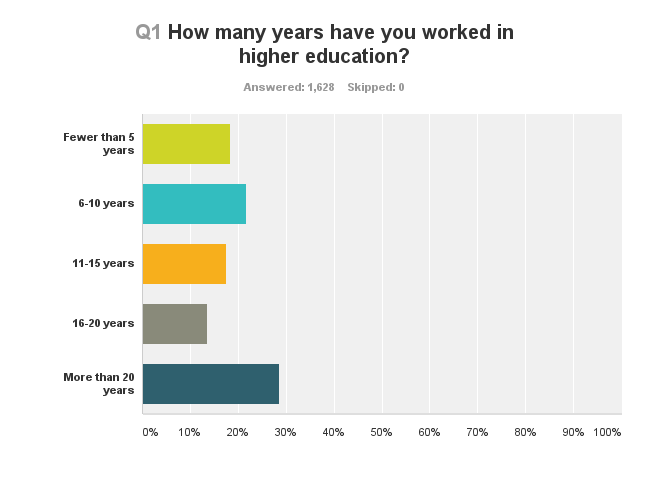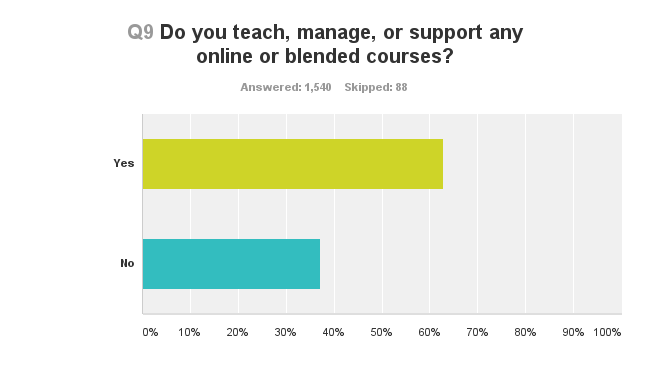Nearly 75
Percent of Faculty Incorporated Technology into their Teaching in the Past Year
By: Mary Bart
When it comes to technology in the classroom,
phrases like “faculty resistance” and the importance of getting “faculty
buy-in” are tossed around with great frequency. But is that perception still
valid? Are all instructors so set in their ways, skeptical of anything new, and
fearful of deviating from what they’ve done that it’s nearly impossible to get
them to try something new?
Hardly. Just look at the results of the Faculty
Focus reader survey conducted earlier this year. A full 73.67 percent of
readers who took the survey said they incorporated technology into their
class during the past year. It was the third most popular activity,
exceeded only by an impressive 85.81 percent who attended a professional
development workshop or conference and 83.92 percent who used a rubric.
During
the past year, have you engaged in the following:
|
Yes
|
No
|
N/A
|
|
|
Incorporated
a new technology into your course
|
73.67%
|
20.58%
|
5.76%
|
|
Taught
a capstone course
|
23.88%
|
61.38%
|
14.75%
|
|
Taught
a service learning course
|
24.02%
|
62.92%
|
13.06%
|
|
Used a
rubric
|
83.92%
|
11.38%
|
4.71%
|
|
Attended
a professional development workshop or conference
|
85.81%
|
12.71%
|
1.47%
|
|
Taught
a course you’ve never taught before
|
50.91%
|
42.28%
|
6.81%
|
|
Taught
a flipped course
|
27.18%
|
62.71%
|
10.11%
|
|
Participated
in a faculty mentoring program
|
40.80%
|
52.39%
|
6.81%
|
That was one of the key findings from the annual
survey, which was distributed to Faculty Focus readers this spring
seeking their feedback on everything from their biggest day-to-day challenges
to the types of articles they’re most interested in reading. And, like last
year, we asked if their job was more difficult than it was five years ago. Of
those who responded, 48.38% said “more difficult.” This was a slight, but
statistically insignificant, dip from 50% in 2013. More than a third (35.54%)
said “about the same,” 9.53 said “less difficult,” and for 6.55% the question
didn’t apply.
For those who find their job more challenging, the
reasons are varied, but largely unchanged from the previous year. Many readers
commented that today’s students seem less prepared and less motivated for the
rigors of college, are more likely to argue about assignments and grades, and
often have unrealistic expectations for how quickly faculty should respond to
emails. Some mentioned larger classes or a heavier course load, while for
others it’s keeping up with technology (often without proper training on how to
use it), or a move to an online or blended classroom that’s adding extra hours
to their work day. Additional committee work and administrative
responsibilities also were mentioned frequently, as were budget cuts that have
reduced the availability of resources and support.
Readers’ explanations for why their job is more
challenging were reiterated in their rating of the biggest day-to-day
challenges. For the third year in a row, unmotivated and unprepared students
were identified as the biggest day-to-day challenges. Readers rated as “very
problematic” students who are not prepared for the rigors of college
(29.44%) and students who come to class unprepared (26.77%). They rated
as “moderately problematic” student motivation (33.98%)
What are
some of your biggest day-to-day challenges? Please rate these issues.
|
Not a
Problem
|
Slightly
Problematic
|
Moderately
Problematic
|
Very Problematic
|
|
|
Students
who are not prepared for the
rigors of college |
8.44%
|
26.77%
|
35.35%
|
29.44%
|
|
Students
who come to class unprepared
|
6.64%
|
27.42%
|
39.18%
|
26.77%
|
|
Student
motivation
|
12.87%
|
35.86%
|
33.98%
|
17.28%
|
|
Institutional
budget cuts
|
20.42%
|
28.42%
|
26.09%
|
25.07%
|
|
Technology
distractions
|
18.80%
|
35.50%
|
31.45%
|
14.24%
|
|
Demands
outside of teaching (e.g. committee work, research, publishing
demands)
|
24.62%
|
29.76%
|
26.36%
|
19.26%
|
|
Keeping
up with technology
|
27.30%
|
38.60%
|
25.56%
|
8.54%
|
|
Increased
class size
|
48.23%
|
24.01%
|
17.64%
|
10.12%
|
|
Lack of
collegiality in the workplace
|
44.76%
|
31.44%
|
15.65%
|
8.15%
|
|
Student
incivility
|
54.08%
|
31.73%
|
11.86%
|
2.33%
|
As a follow-up to this question, readers were given
the option to share some of the other challenges they face on a regular basis.
Here are just some of the comments we received:
- Large variation of basic skill levels within classroom.
- Keeping up with the advancements in science and what our students are expected to know.
- Students seem split: Some are very prepared, some lack basic skills. This results in tensions in a bi-level group.
- Handling change at the rate that it’s coming now—surviving, adapting, evolving, doing it all again—while maintaining vital relationships with colleagues.
- As an adjunct, the biggest problem is lack of job stability/security, and lack of access to tech smart rooms. We are simply not first in line for resources that should be available.
- Discipline in the classroom, something I did not expect on the college level.
- Lack of time to implement new technology and learn it.
- Teacher burn-out; student cheating or plagiarism; rapport between instructors and students; administrators obsessed with enrollment; faculty evaluations.
- Providing timely, meaningful feedback.
- Lack of student motivation in required courses.
- Course redesign without devotion of enough time to see what is working; the drive to change without sufficient data to warrant the change
- Constantly upping the requirements for tenure
- I have a contract teaching position, and I have no clear path to promotion, much less job security. We contract hires do not have an advocate / mentor manager in the administration.
- Lack of college readiness is definitely the biggest issue — specifically in terms of critical thinking ability.
- Keeping up with grading in general. Also, wanting to correct writing—paragraph and sentence structure, grammar, word choice— while dealing with content issues.
- Grading load. I teach almost all Core classes (freshmen), and the grading load is intensified by students’ lack of basic skills in reading comprehension, writing, and research.
- Institution’s focus on publication and research, which takes time away from class preparation.
- Students who feel entitled and expect grades of A for poor work.
- Lack of professional development opportunities at institution.
- Faculty stubbornness / resistance to change.
- Too many demands on my time; no way to deal with them all.
- Lack of communication and sharing within our department.
Survey demographics
The annual Faculty Focus survey was
conducted in March and April of this year with 1,628 readers completing the
online survey. Approximately 65 percent identified themselves as professor/instructor.
The largest percentage (29.36%) working at four-year public institutions,
followed by four-year private institutions (26.5%), and two-year public
institutions (24.06%). In terms of how long they have worked in higher
education, it ranged from fewer than five years (18.37%), six to 10 years
(21.74%), 11-15 years (17.57%), 16-20 years (13.64%) and more than 20 years
(28.69%).
 |
|
|
|
|
For the third year in a row, the number of readers
who teach, manage or support at least one online and blended course went
largely unchanged—63.86 percent in 2014 compared to 64 percent in 2013 and 62
percent in 2012. The number stood at 55 percent percent in 2011.

|
|
Another question that delivers consistent responses
each year asked readers to rate article topics. Learner-centered teaching,
teaching with technology, assignment strategies, course design, and
facilitating discussion continue to gather the highest interest and will remain
at the heart of what we do here at Faculty Focus.
Thank you for your feedback
Our 2014 survey marks the fourth year we’ve
conducted a reader survey and each survey brings new insight into our readers’
challenges, needs, and interests. We would like to thank everyone who took the
time to share their thoughts. The feedback has helped to confirm suspicions,
challenge assumptions, and offer valuable perspective to the work we do.
See
more at:
http://www.facultyfocus.com/articles/teaching-and-learning/faculty-incorporating-technology-into-teaching/?ET=facultyfocus:e75:267813a:&st=email#sthash.iynuinES.dpuf




Nenhum comentário:
Postar um comentário